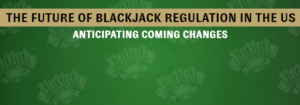The Future of Blackjack Regulation in the US: Anticipating Coming Changes
The game of blackjack has gained immense popularity in the United States, prompting the need for updated regulations to address emerging challenges. In this article, we will explore the current landscape of blackjack regulation, discuss the impact of technological advancements and changing attitudes, and anticipate potential changes in regulations, considering federal involvement, responsible gambling measures, and the balance between innovation and consumer protection.
| 21+ | Terms & Conditions Apply | NJ Residents Only | ||
 | $25 FREE on Signup 100% up to $1.000 on First Deposit Hotspot Leaderboard | Visit Casino |

Current Landscape of Blackjack Regulation in the US
The current landscape of blackjack regulation in the United States is a patchwork of federal and state-level regulations, with additional considerations for tribal gaming compacts. At the federal level, there is no specific legislation governing blackjack, leaving the regulation primarily in the hands of individual states. As a result, the rules and regulations surrounding blackjack can vary significantly from one jurisdiction to another, leading to inconsistencies in gameplay, player experiences, and the potential for confusion among players.
State-level regulations often determine the minimum gambling age, licensing requirements for operators, and the specific rules governing blackjack, including the number of decks used, doubling down options, and surrender rules. Tribal gaming compacts further complicate the regulatory landscape, as Native American tribes operate casinos on sovereign land and have the authority to negotiate their own agreements with state governments. This can result in variations in blackjack rules and regulations between tribal casinos and other establishments within the same state.
Technological Advances and Online Blackjack
Technological advances have had a profound impact on the gambling industry, including the rise of online blackjack platforms. The advent of internet gambling has opened up new opportunities for players to enjoy blackjack from the comfort of their homes or on their mobile devices. Online blackjack platforms offer convenience, accessibility, and a wide range of game variations to cater to different player preferences.
However, the proliferation of online gambling also presents challenges. There is a need to ensure that online blackjack platforms are regulated effectively to protect players from fraudulent or unscrupulous operators. Issues such as player identity verification, age verification, and geolocation technologies become critical to prevent underage gambling and ensure compliance with jurisdictional regulations.
Regulating online blackjack involves addressing concerns related to fair gameplay, secure transactions, and responsible gambling practices. Implementing robust systems for random number generation and auditing mechanisms can help ensure that the outcomes of online blackjack games are fair and unbiased. Additionally, responsible gambling measures such as setting deposit limits, providing self-exclusion options, and offering resources for problem gambling support should be integrated into online blackjack platforms to promote safe and responsible play.
Changing Attitudes and Social Implications
Over the years, there has been a shift in public perception towards gambling, including blackjack. Once considered solely a form of entertainment based on luck, blackjack is increasingly recognized as a skill-based game that requires strategy and decision-making. This changing attitude towards blackjack has implications for regulatory frameworks and responsible gambling initiatives.
The recognition of blackjack as a skill-based game challenges traditional views of gambling solely as a matter of chance. It raises questions about how regulations can best accommodate the element of skill while still ensuring fairness and protecting vulnerable players. Regulators may need to revisit and revise existing blackjack rules to reflect this evolving perception of blackjack and create a regulatory environment that acknowledges and embraces the skill component of the game.
Furthermore, the changing attitudes towards gambling can influence public policies and social acceptance. As more people view blackjack as a legitimate recreational activity, there may be increased support for regulated gambling options and a shift away from stigmatizing attitudes. This can lead to a more open and informed public dialogue about gambling regulation, responsible gambling practices, and the allocation of resources to address potential gambling-related harms.
To address these social implications, regulatory frameworks should prioritize responsible gambling initiatives. Education programs that promote awareness of the risks associated with gambling and provide resources for individuals seeking help should be an integral part of blackjack regulations. Collaboration between regulators, industry stakeholders, and advocacy groups can facilitate the development of effective responsible gambling strategies that protect players while allowing them to enjoy the game responsibly.
Potential Changes in Blackjack Regulations in the US
The evolving gambling landscape and emerging technologies have prompted discussions about potential changes in blackjack regulations. Several states have been reevaluating their approach to gambling regulation, including blackjack, to adapt to the changing needs and preferences of players.
One area of focus is updating rules and guidelines to accommodate technological advancements. The rise of blockchain technology and cryptocurrencies has the potential to revolutionize the gambling industry, including blackjack. Integrating blockchain-based systems can enhance transparency, security, and player trust in the fairness of blackjack games. Regulators may consider exploring the feasibility of incorporating blockchain technology into blackjack regulations to ensure tamper-proof record-keeping, secure transactions, and provably fair gameplay.
Another aspect that regulators are considering is the harmonization of rules and regulations across states. Inconsistencies in blackjack regulations can create confusion for players and hinder the growth of the industry. States may collaborate to establish standardized rules for blackjack, allowing for a more seamless experience for players and promoting interstate cooperation.
Moreover, regulators are increasingly focusing on player protection and responsible gambling measures. The potential changes in blackjack regulations may include mandatory responsible gambling features such as time and deposit limits, as well as self-exclusion programs that enable players to restrict their access to blackjack games if needed. Implementing these measures can help mitigate the risks associated with excessive gambling and promote a safer gaming environment.
Furthermore, as the use of digital currencies continues to gain traction, regulators may evaluate the implications of cryptocurrency transactions in blackjack. Developing guidelines for cryptocurrency use, including proper identification and anti-money laundering measures, will be essential to ensure compliance with existing financial regulations and prevent fraudulent activities.
Final Thoughts on Blackjack Regulation in the US
By embracing these potential changes in blackjack regulations, regulators can adapt to the evolving gambling landscape, foster innovation, and protect players while promoting responsible gambling practices. This will allow growth of the gambling industry which could bring substantial benefits.
| 21+ | Terms & Conditions Apply | NJ Residents Only | ||
 | $25 FREE on Signup 100% up to $1.000 on First Deposit Hotspot Leaderboard | Visit Casino |

